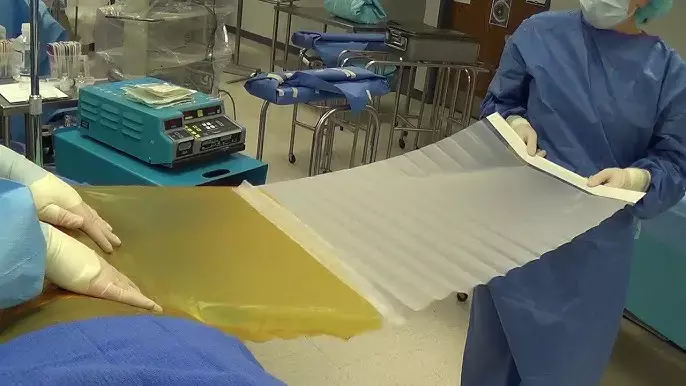- Home
- Medical news & Guidelines
- Anesthesiology
- Cardiology and CTVS
- Critical Care
- Dentistry
- Dermatology
- Diabetes and Endocrinology
- ENT
- Gastroenterology
- Medicine
- Nephrology
- Neurology
- Obstretics-Gynaecology
- Oncology
- Ophthalmology
- Orthopaedics
- Pediatrics-Neonatology
- Psychiatry
- Pulmonology
- Radiology
- Surgery
- Urology
- Laboratory Medicine
- Diet
- Nursing
- Paramedical
- Physiotherapy
- Health news
- Fact Check
- Bone Health Fact Check
- Brain Health Fact Check
- Cancer Related Fact Check
- Child Care Fact Check
- Dental and oral health fact check
- Diabetes and metabolic health fact check
- Diet and Nutrition Fact Check
- Eye and ENT Care Fact Check
- Fitness fact check
- Gut health fact check
- Heart health fact check
- Kidney health fact check
- Medical education fact check
- Men's health fact check
- Respiratory fact check
- Skin and hair care fact check
- Vaccine and Immunization fact check
- Women's health fact check
- AYUSH
- State News
- Andaman and Nicobar Islands
- Andhra Pradesh
- Arunachal Pradesh
- Assam
- Bihar
- Chandigarh
- Chattisgarh
- Dadra and Nagar Haveli
- Daman and Diu
- Delhi
- Goa
- Gujarat
- Haryana
- Himachal Pradesh
- Jammu & Kashmir
- Jharkhand
- Karnataka
- Kerala
- Ladakh
- Lakshadweep
- Madhya Pradesh
- Maharashtra
- Manipur
- Meghalaya
- Mizoram
- Nagaland
- Odisha
- Puducherry
- Punjab
- Rajasthan
- Sikkim
- Tamil Nadu
- Telangana
- Tripura
- Uttar Pradesh
- Uttrakhand
- West Bengal
- Medical Education
- Industry
Can Iodophor-Impregnated Drapes be used in patients with Iodine-Related Allergies?

The use of iodophor-impregnated adhesive drapes have become almost universally incorporated into standard practice of arthroplasty draping technique. Iodine-related allergies in patients planned for joint replacement present a challenge in terms of the best course of action to minimize complications and optimize outcomes.
A retrospective case series was conducted of patients that received an iodophor-impregnated drape as part of draping for a total hip or knee arthroplasty at a single orthopaedic-specific hospital with documented iodine-related allergies. Draping technique involved application of a skin preparation solution at the discretion of the treating surgeon with layered draping utilizing nonpermeable, adhesive U drapes, followed by single-use top drapes. The iodophor-impregnated adhesive drape was then applied to the surgical site covering all remaining exposed skin. 9816 total hip arthroplasty and total knee arthroplasty cases were reviewed, and 135 were documented to have an iodine-related allergy for a prevalence of 1.38%. Intraoperative and postoperative records were reviewed to screen for an allergic reaction or wound healing issues that may have been related to an adverse reaction to the use of the iodophor impregnated drape.
Key findings of the study were:
• Of the 135 patients, 43 had iodine listed as an allergy, 85 had shellfish, 20 had iodinated contrast media, and 3 had povidone iodine.
• Sixteen patients had a cluster of iodine-related allergies.
• There were no intraoperative reports of an allergic reaction to this drape.
• There were four superficial wound problems, none of which were documented to relate to an allergic dermatitis reaction, and none required further surgery.
The authors concluded that - “Patients reporting iodine-related allergies were present in 1.38% of patients undergoing hip or knee arthroplasty in our series. We encountered no allergic reactions or adverse outcomes that could be attributed to the use of iodophor-impregnated adhesive drapes in these patients. Patients with documented allergies to povidone iodine, as distinct from ‘iodine’, shellfish, or ICM should be considered for patch testing prior to proceeding with the utilization of iodophor incise drapes until further research can confirm safety in these patients.”
Further reading:
The Use of Iodophor-Impregnated Drapes in Patients With Iodine-Related Allergies: A Case Series and Review of the Literature
Andrew Fraval, Nicolina Zappley et al
Arthroplasty Today 23 (2023) 101201
https://doi.org/10.1016/j.artd.2023.101201
MBBS, Dip. Ortho, DNB ortho, MNAMS
Dr Supreeth D R (MBBS, Dip. Ortho, DNB ortho, MNAMS) is a practicing orthopedician with interest in medical research and publishing articles. He completed MBBS from mysore medical college, dip ortho from Trivandrum medical college and sec. DNB from Manipal Hospital, Bengaluru. He has expirence of 7years in the field of orthopedics. He has presented scientific papers & posters in various state, national and international conferences. His interest in writing articles lead the way to join medical dialogues. He can be contacted at editorial@medicaldialogues.in.
Dr Kamal Kant Kohli-MBBS, DTCD- a chest specialist with more than 30 years of practice and a flair for writing clinical articles, Dr Kamal Kant Kohli joined Medical Dialogues as a Chief Editor of Medical News. Besides writing articles, as an editor, he proofreads and verifies all the medical content published on Medical Dialogues including those coming from journals, studies,medical conferences,guidelines etc. Email: drkohli@medicaldialogues.in. Contact no. 011-43720751


